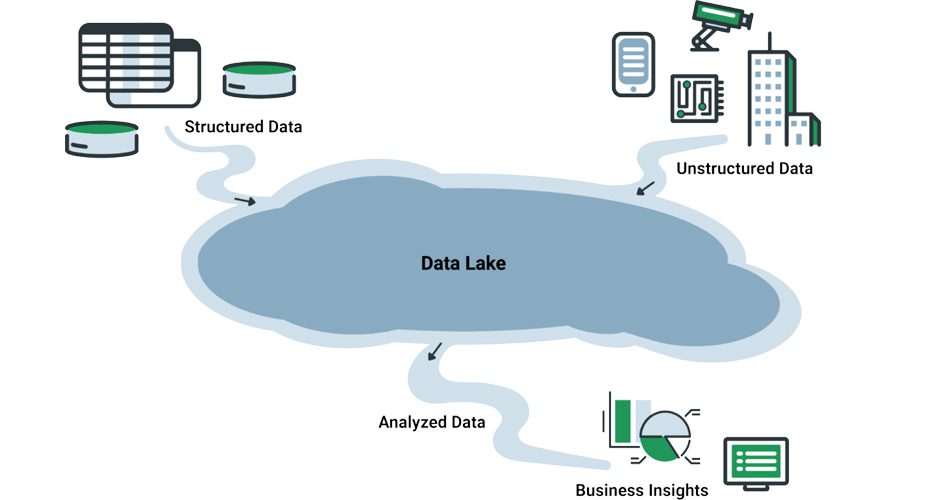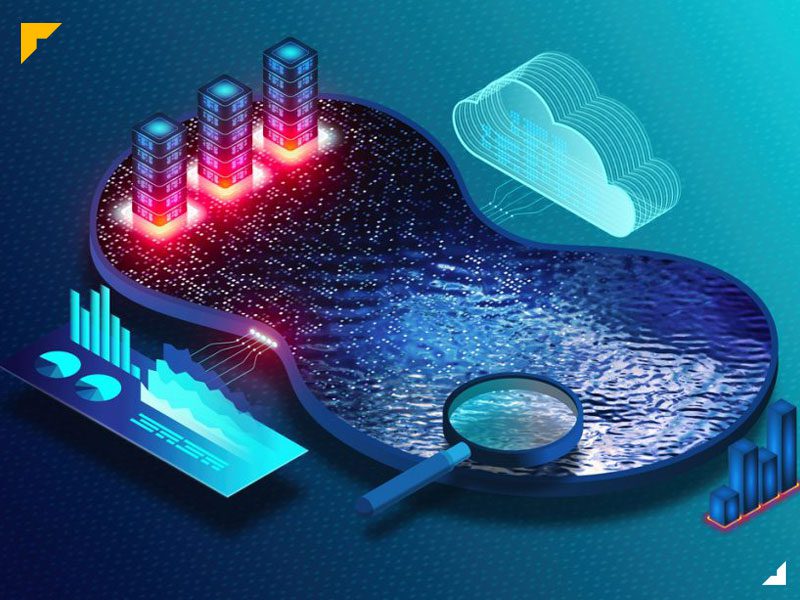Data is critical to modern businesses. These organizations have vast and diverse data that they want to use as much as possible. A data lake can act as a single repository for data storage in data-driven organizations.
Coined by Pentaho CTO James Dixon, the term “data lake” refers to the temporary nature of data in a data lake. Unlike data stored in traditional data warehouse systems, this data is not cleaned and processed.
What is data lake?
A data lake is a centralized repository for hosting raw, unprocessed enterprise data. Data lakes can be hundreds of terabytes or even petabytes in size and store duplicate data from operational sources, such as databases and SaaS platforms. They make the organization’s unedited data available to those who are authorized to access that data.
The data stored in a data lake can be anything from completely unstructured data such as text documents or images, to semi-structured data such as hierarchical web content, to information contained in a relational database. This flexibility means that companies can store anything – from raw data to analytical results – on these lakes.
How do data lakes work?
Data lakes use a flat architecture with no hierarchy of files or folders. Each piece of data in the data lake is tagged with a set of metadata and assigned a unique identifier. Data lakes are drawn from a wide variety of data sources, including mobile apps, websites, and enterprise applications.
A data lake improves business performance by storing all data in one place instead of multiple separate data silos. Due to the huge and growing volume of data and the need for global access, data lakes are usually implemented in cloud-based storage.
How do data lakes work?
Why do we need a data lake?
Companies and organizations that value their data and use it to create business value are more successful than their competitors. The results of a survey show that organizations that have implemented a data lake in their structure, their organic revenue growth has increased by about 9% compared to similar companies.
With the help of the data lake, the managers of these companies were able to perform new analyzes such as machine learning from various sources such as log files, data related to clicks, social networks and devices connected to the Internet. These analytics helped them to identify and act on business growth opportunities faster by attracting and retaining customers, increasing productivity, better preventive maintenance of devices, and making informed decisions.

The most important advantages of using a data lake
A data lake is a cost-effective way to store large volumes of data that can be powered by advanced analytics tools. The most important advantages of using the data lake are:
Function: Data lakes work well with big data analytics tools such as machine learning, artificial intelligence algorithms, advanced real-time analytics, and predictive modeling.
Scalability: Data lakes can handle large volumes of data that expand and fluctuate based on data input. Data lakes are the best option for businesses with rapidly growing data storage needs.
Low costs: Most data lakes use open source technologies, which are very affordable for organizations.
The most important disadvantages of using a data lake
Data lakes can become data swamps! The most important disadvantages of using these lakes are:
Complexity: As we said earlier, data lakes contain large amounts of data, and data professionals and engineers are usually the only users who can sort through them. In general, we need professional skills to extract data analysis from data lakes.
Data quality: Sifting through data lakes is a time-consuming process. These lakes require regular data organization to manage and maintain their data integrity. Without proper care and attention, a data lake can become a quagmire of unusable data that lacks clear identifiers or metadata information.
Security risks: When data is stored in a data lake, security risks and access control issues may arise. Without proper monitoring, certain pieces of sensitive data can exist in a data lake and be used by anyone who has access to the data lake.
What is the difference between database, data warehouse and data lake?
A data warehouse, data lake, and database can all provide efficient methods for data mining and analysis, with different capabilities for different amounts of data.
Database
A database usually collects some kind of raw data. Of course, in a relational database, we will have different types of related data. Organization managers or data specialists deal with a simple data set that is classified for quick analyses. Databases use a data management system called SQL to determine how to store and retrieve data for the end user. Databases also tend to use metadata to help categorize the data they store.
data warehouse
A data warehouse greatly increases the possibility of decision-making by managing a lot of historical data, usually from different sources. Data warehouses offer sophisticated methods of organization and analysis. These methods, known as schemas, are rules or algorithms for making data useful. Together, schemas make up a data model. A data warehouse usually contains SQL but may also include other business intelligence tools.

Data Lake
Data lake is an innovation in the field of data mining. A data lake can handle larger volumes of data than a traditional data warehouse and accommodate heterogeneous data. A data lake architecture lacks the blueprint that a data warehouse has. These fundamental differences allow users more flexibility.
Neor; Data infrastructure solution
Neor is a data lake design, implementation and setup service in Sahab. This company has done dozens of successful large-scale data lake projects so far. Neor Data Lake is a creative and unique solution that provides the infrastructure for the transformation of organizations.
Utilization of expert human resources, experience of large-scale projects and the possibility of consulting to find the best solution are among the most important advantages of Neor.
If you operate in the retail, fast-moving consumer goods, banking, insurance and financial services, telecom and communications, multimedia content and entertainment, tourism and hospitality, transportation and healthcare industries, Neor can be the right solution to improve your business.







